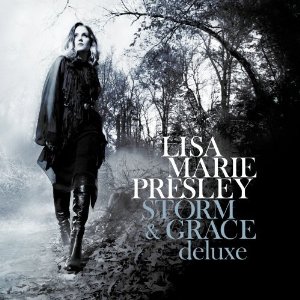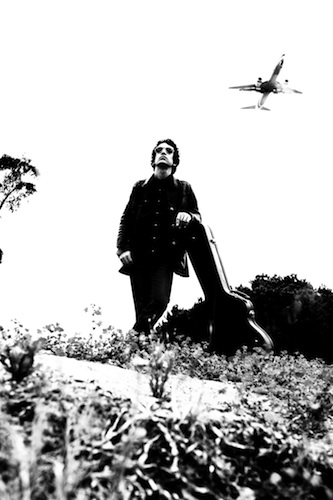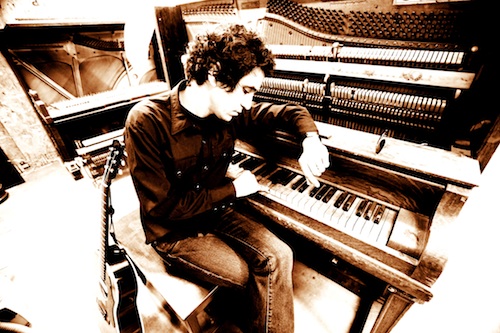

A Conversation with Lisa Marie Presley
Mike Ragogna: Lisa, you have a new album, Storm & Grace, and you approached this one very differently than your others, especially by working on it with T-Bone Burnett. Can you tell us the history of how the project came together?
Lisa Marie Presley: It came together very organically. Nothing was contrived. A few years ago, Simon Fuller, he kind of just set up for me to go to England and write with various writers. The plan was to go for about a month and see what happened and get with different types of people to write with. I kind of half expected to write and then be done with it in a month, but I ended up staying for eight months and fell in love with England. I wrote thirty-two songs and came back to Los Angeles and sold everything and was about to move. Right before I left, I got the call that T-Bone had heard the demos and that he wanted me to meet him, so I went over to his home, and he said he really liked what he heard, and he wanted to do the record. I was beside myself! So that's kind of how it unfolded.
MR: Nice, and T-Bone is apparently a fan of yours. He's been quoted, "Listening beyond the media static, Lisa Marie Presley is a Southern American folk music artist of great value."
LMP: You know, it's funny, when I read these things he says, I'm usually blown away. I read about it in an article, but he hasn't said it to me personally, necessarily. But I would love to hear what he has to say.
MR: I've also interviewed T-Bone and he's definitely as organic, personality-wise, as you can get.
LMP: He is, he is, definitely. It's really a simple thing. A song is about telling a story, so he was very adamant about, "Don't try and overdo it. Don't try and prove anything. You're telling a story in a song. That's what you're doing."
MR: While you were in the studio together, what was the experience like? Does he guide you at all?
LMP: You know, he doesn't. He really grants a lot of freedom. Basically, we'd come in, everyone was sitting around listening to the demo, and then the musicians and I would go out and just go for it live. He gave everyone so much freedom to kind of do their own take on what they heard. The only time he gave me any guidance is when he was really adamant, like, "I don't want you trying to oversing or try to sound like a white girl trying to sing like a black girl." He was really not into any of that stuff, which I liked.
MR: You had thirty-two songs to choose from, how did you whittle it down to the twelve?
LMP: I think we did sixteen songs in twelve days, so it was basically whatever vibe we were all feeling that day. He's play it on his computer, and then he would skip or fast forward or go backward and go, "Okay, let's go after this one. I like this one." It just kind of happened like that.
MR: Now, I'd say the majority of these songs -- this is just from my perspective, and I could be thoroughly wrong -- are about relationships.
LMP: You mean like romantic relationships?
MR: No, no. not necessarily. What I mean is like "people" relationships. Can you tell me, when you look at this body of work, does it feel like it has a theme to it?
LMP: No. Honestly, when I sit and write, I'm channeling in a really weird way, so whatever comes in my mind while that's happening are the words, and it's just about ordering them to put them down on paper. When I write, it's like first person, second person, third person -- something I've thought, something I've heard... It could be anything. I kind of write metaphorically as well, and it's strange because when I sit and write, I'll be channeling something or processing some demon or emotion or something that I'm going through or seen, and then when I'm done with it, I'm done. I kind of just want to leave it as a canvas for anyone to take. When I write a song, I love to make it so that not just I experience it, but other people can relate to it. As a songwriter, it's important to me to make it kind of universal in how I put it, so I like it to be a canvas for anybody to make it whatever they want.
MR: Right. Now for you, when you listen back to your songs in the end, do you ever go, "Ah, yeah, I get what I did there"?
LMP: Yeah, definitely. Having been deconstructed and reconstructed myself, it was definitely being written during that process, I would say. For sure. You can kind of see this evolution and the journey of that.
MR: The everything truly is organic about this project, including the experience.
LMP: Everything. We didn't even have a label when we recorded this. There was no plan, and no plan to make it sound a certain way. There was no plan to do anything with the songs. I was just kind of holding on to those songs and didn't particularly have any plan with them before T-Bone heard them. Everything just kind of unfolded in its own time and its own way.
MR: You co-wrote some of the material with Richard Hawley from Pulp and Fran Healy from Travis. What was collaborating like?
LMP: It's funny because my husband actually was a big fan and knew Richard. He worked in Sheffield, which is a part of England where Richard is from, and he's the one who suggested to me working with him. Richard hadn't really written with anyone else, and it was a really fun collaboration. It was just really different. No one was like, "Here, get with this hit writer." None of that. It was just to get with these really kind of obscure, cool, left of center artists, and Richard definitely falls into that category. Ed Harcourt was another one. He's kind of a cross between Tom Waits and Jeff Buckley. He's a really cool combo of those people, and he's so talented, it's unbelievable. Fran was again just kind of an obscure idea of who to write with and get with who had never really written with anyone aside from his own band members either. I think it was called "Heartless," the one we wrote, and I think that was the only lyrical collaboration I did with anyone.
MR: It seems like you're examining yourself in a lot of the songs on Storm & Grace. I would love to know if there's a song on that you could go into in depth and give an example of what you were going through at the time and how you got out at the other end.
LMP: Gosh! Well, the whole record is kind of like that, to be honest with you. I went through so much during that, and I think it's all captured. I don't want to be rude or anything, and respectfully I say this. I'm really old fashioned, and I hate to say what my songs specifically are about because I feel like it ruins it for other people to have for themselves.
MR: That's cool, no worries.
LMP: I went through a lot, and you could probably tell that in the lyrics.
MR: And that's why I wanted to ask that question because I wanted to get your perspective, not mine. But I do appreciate the fact that you want me to figure it out for myself, too.
LMP: Yeah, you know, I'm such a fan of songs and I love songs, especially if they're not too literal and I can make them my own. And then the artist comes out and says who or what they're writing about and I get so upset. I have to think about that every time I hear it, you know?
MR: Yeah, true. Lisa Marie, with Storm & Grace, did you have any idea or thoughts about how you might be approaching this body of work?
LMP: I did not. I absolutely did not. When I first went over there, I was put with so many different great writers, songwriters and artists, and I kind of started off the writing process doing what I used to do, which was sort of rock and lots of stuff going on. My first few songs that I wrote in England were a little bit like what I used to do, so I just went right into the usual format because it was comfortable for me. I even got into electronic writers and wrote some interesting stuff with them, and then, I don't know. I got with Richard and I got with Sacha Skarbek, who I wrote a lot of songs with, and this started evolving -- the sound that happened naturally with Richard, Sacha and Ed and Fran. I went immediately to what was familiar, and I started writing really similar songs that were on my first two records, and then there was a breakthrough at some point, and this just really simple, raw, and organic vibe just started to come out. It became that, no matter who I was with, it was coming out. It was just there.
MR: Lisa, what is your creative process when you're writing?
LMP: I sit in a room with the writer, who's usually got either a piano or a guitar. We sit and we hum and we lock into a melody that we agree on for the verse and the chorus and the bridge. They leave me for anywhere from two to seven hours in the room looping and going insane with myself, torturing over exactly the phrasing of the words and lyrics. That can take anywhere from two to six to seven hours, but I'd never walk out without it done. I'll stay all day. And then they come back in, and they have no idea what's going to come out of me and I just sing it.
MR: Nice. And what's great about the organic-ness of this project is that you're not thinking about anything as far as what a finished product will be. You're just writing the song.
LMP: Right. Every day, I'd go in with whatever was on my mind. The melody normally inspired me to go somewhere as far as the idea of the song, and then that was it. It was really just like by day or by hour.
MR: Lisa, what advice might you have for new artists?
LMP: I think that learning this stuff and listening to early music and understanding where music came from. Everything has it's place, and all music is important, but it's really important to know where it came from, how it started. Get in there and learn all of it. The process of how it works. Even though there are machines that can sing for you, don't go there. Try to just keep it as organic as possible. Keep your integrity -- your artistic integrity. As hard as that may be, it's the most important thing.
MR: Project to project, are you able to keep what you're really feeling as the vision of your projects over the years?
LMP: I think that with the first two, I was struggling with my own, "What am I going to do," and "How am I going to not be compared to my father," or "How am I going to get through this," basically. I want to be a singer/songwriter. I feel that music is important. How do I accomplish this? It was a bit of a struggle, and I kind of came out kicking and screaming. Then I had to sort of figure my way out, and I did finally, but it took a process. I think everything always does.
MR: Yeah. Can I throw something out there? You mentioned your father. Because of the organic-ness and the honesty and the Lisa Marie Presley presence on the recordings, do you feel like this might be the closest to the vibe -- not necessarily the recordings -- of what your dad, Elvis, was trying to do?
LMP: I do because it's just so stripped down. It wasn't intentional. I will say that, first off. If it's there, it's there, and I'm not afraid of that, and it is there. There are textures and tones that I can hear that are similar for sure. I think it basically because for the first two records, I really was pushing too hard and overproducing and yelling and screaming and making everything as loud as possible and hiding as much as possible. So this is the first really stripped down thing, and you can really hear me, and it is about the voice and the song, which is what it used to be like way back when music started. So yes, being that it is more along those lines, I can definitely hear it. I can hear tones and textures. However, I would never ever claim to sing as well as he did! (laughs)
MR: But you've also had other influences. Who were some of them?
LMP: Always singer/songwriters. Joan Baez, Linda Ronstadt, Heart. God, there are so many. Tracy Chapman... I love women who sing, and they mean what they're saying, and they reach in and grab you. It moves you. You can feel the singer, and it's for real. It's a story. It's kind of '70s singer/songwriters. I like all that stuff.
MR: Yeah, me too. I grew up on that stuff. Two of my favorites from that school are Paul Simon and Joni Mitchell.
LMP: Yeah, I love Neil Young. I've just recently discovered him on my own. I know everybody else knew him, but I just found him. I love all that stuff.
MR: Is there anybody you're listening to right now that's more contemporary?
LMP: I love the Gotye song "Somebody That I Used To Know." I was pretty excited that that was heard and brought up to the front.
MR: What does the future hold for Lisa Marie Presley, like touring and all that?
LMP: They're trying to secure a little promo tour here soon, just a quick one. And then, preferably and hopefully, I will have a proper tour. I also have to go overseas. Everything's flying around. Every week it changes. (laughs) At some point, there'll be a tour, and there'll be me going overseas to promote over there and all that stuff. So I'm just riding this wave right now.
MR: Nice. All right, I want to wish you all the best with Storm & Grace, Lisa Marie. Thanks for your time and, well, grace.
LMP: Thank you so much, really, thank you.
Tracks:
1. Over Me
2. You Ain't Seen Nothin' Yet
3. Weary
4. Close To The Edge
5. So Long
6. Un-Break
7. Soften The Blows
8. Storm Of Nails
9. How Do You Fly This Plane?
10. Forgiving
11. Storm & Grace
12. Heartless
13. Sticks And Stones
14. I Was Wrong
15. Just A Dream
Transcribed by Kyle Pongan
A.J. CROCE TOURS THE EAST COAST IN MAY

A.J. Croce will be bringing his unique amalgam of roots, jazz, bluesy singer/songwriter material to three shows on the East Coast the last week of May. The performances will be at The Infinity Music Hall in Unionville, Connecticut, on May 27th, B.B. King's in NYC on the 29th, and The Katherine Hepburn Theater (The Kate) in Old Saybrook, Connecticut, on the 31st. These are intimate duo concerts timing up with the release of his late father Jim Croce's ABC/Dunhill album You Don't Mess Around With Jim 40 years ago. Though he'll be playing songs from his own catalog, A.J. -- accompanied by guitarist Michael Bizar--also will play a couple of songs from the album, which is very rare for A.J. since he has based his music career on his own material and merits.
Check out A.J. and Michael performing Jim Croce's song "Operator (That's Not The Way It Feels)" in this video:

